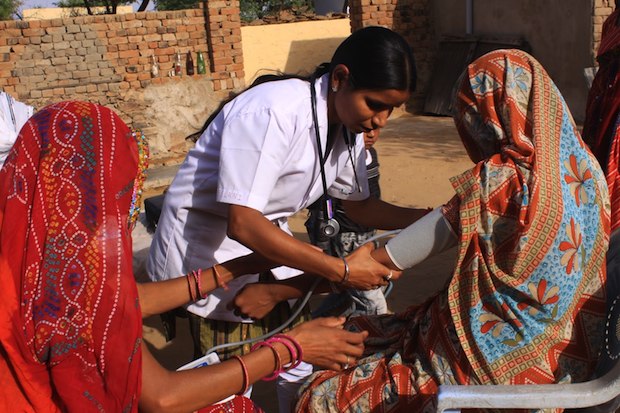What are the Measures to improve Rural Healthcare ?

New Delhi, February 11, 2020 : “Public Health & Hospital” being a State subject, the primary responsibility of improving the health facilities across the country including rural areas lies with the State Governments.
To address the healthcare challenges, particularly in rural areas, the National Rural Health Mission (NRHM) was launched in 2005 to supplement the efforts of the State/UT governments to provide accessible, affordable and quality healthcare to all those who access public health facilities. Currently, NRHM is a sub-mission of National Health Mission (NHM).
NHM support is provided to States/ UTs for setting up of new facilities as per norms and upgradation of existing facilities for bridging the infrastructure gaps and to fill up the vacancies of Human Resource on contractual basis based on the requirement posed by them.
NHM support is also provided for provision of a host of free services related to maternal health, child health, adolescent health, family planning, universal immunisation programme, and for major diseases such as Tuberculosis, vector borne diseases like Malaria, Dengue and Kala Azar, Leprosy etc.
Other major initiatives supported under NHM include Janani Shishu Suraksha Karyakram (JSSK) (under which free drugs, free diagnostics, free blood and diet, free transport from home to institution, between facilities in case of a referral and drop back home is provided), Rashtriya Bal Swasthya Karyakram (RBSK) (which provides newborn and child health screening and early interventions services free of cost for birth defects, diseases, deficiencies and developmental delays to improve the quality of survival), implementation of Free Drugs and Free Diagnostics Service Initiatives, PM National Dialysis Programme and implementation of National Quality Assurance Framework in all public health facilities including in rural areas.
Mobile Medical Units (MMUs) & Telemedicine are also being implemented with NHM support to improve healthcare access particularly in rural areas.
As part of Ayushman Bharat, the Government is supporting the States for transformation of Sub Health Centres and Primary Health Centres into 1.5 lakh Health and Wellness Centres across the country by December, 2022 for provision of comprehensive primary care that includes preventive healthcare and health promotion at the community level with continuum of care approach.
As per the latest Rural Health Survey (RHS) 2019, the number of facilities functioning as per Indian Public Health Standards norms is as follows:
|
Facility Level |
Total |
Facilities Functioning as per IPHS Norms | Percentage IPHS compliant of total |
| Sub Health Centres | 149590 | 5076 | 3.39% |
| Primary Health Centres | 16613
|
1372 | 8.26% |
| Community health centres | 5335
|
1165
|
21.84% |
Under the National Health Mission (NHM) support is also provided to States/ UTs for Rogi Kalyan Samitis (RKS)/Patient Welfare Committees (PWC), Village Health Sanitation & Nutrition Committee (VHSNC) and ASHAs.
ASHAs are trained to work as an interface between the community and the public health system. ASHAs have not only played a critical role in progress on maternal and child health targets, but have also become the key support at community level in rollout of a variety of public health interventions in the area of communicable diseases also.
RKS/ PWC are envisaged to act as a forum to improve the functioning and service provision in public health facilities, increase participation and enhance accountability for provision of better facilities to the patients in the public health facilities at the level of Primary Health Centres and above.
VHSNC are envisaged to take leadership in providing a platform for improving health awareness and access of community for health services, address specific local needs and serve as a mechanism for community based planning and monitoring.
The Minister of State (Health and Family Welfare), Sh Ashwini Kumar Choubey stated this in a written reply in the Rajya Sabha here today.






